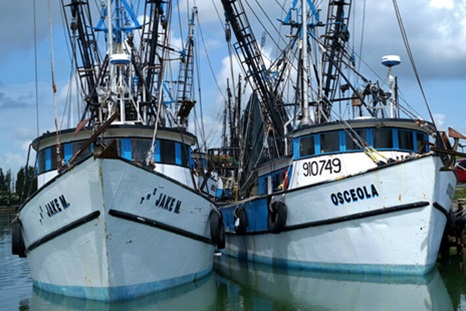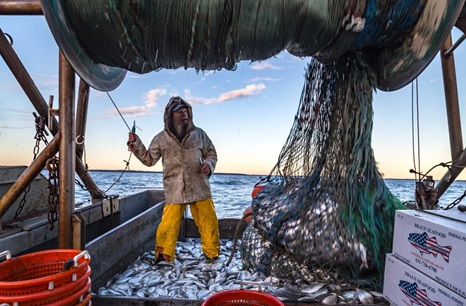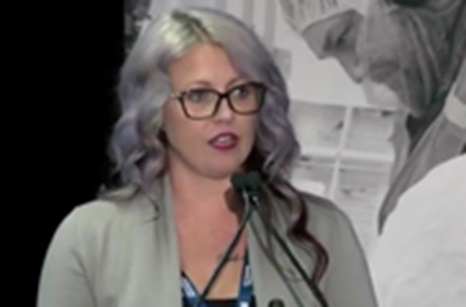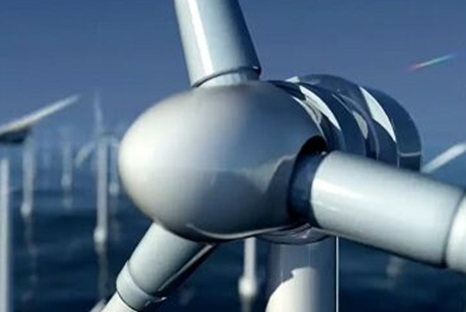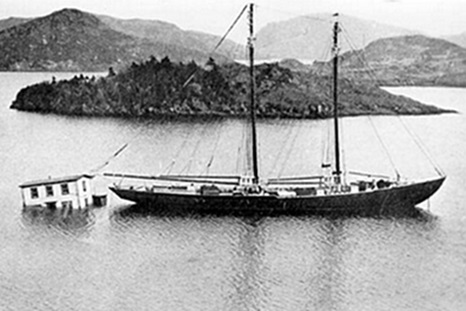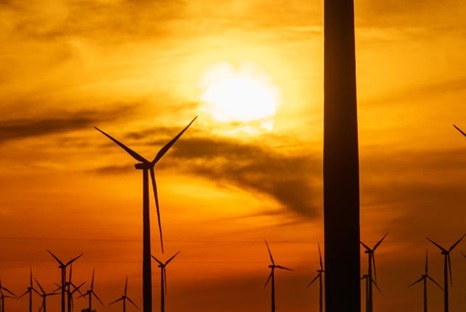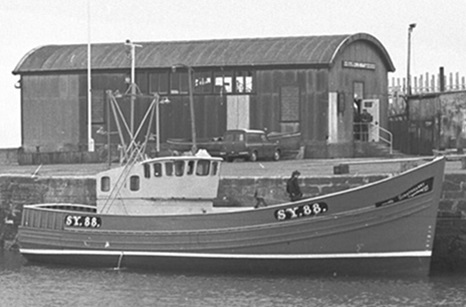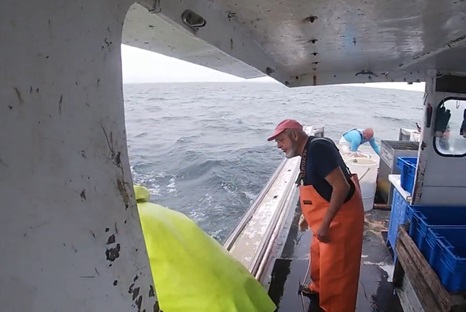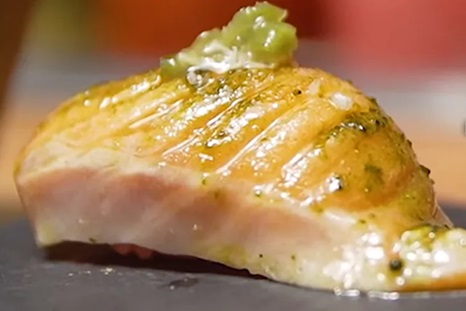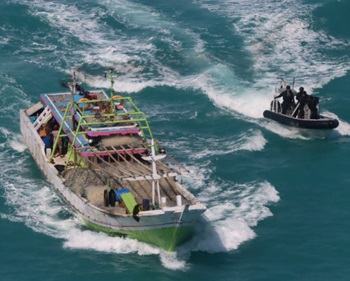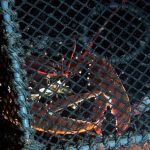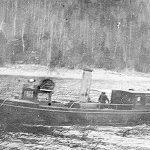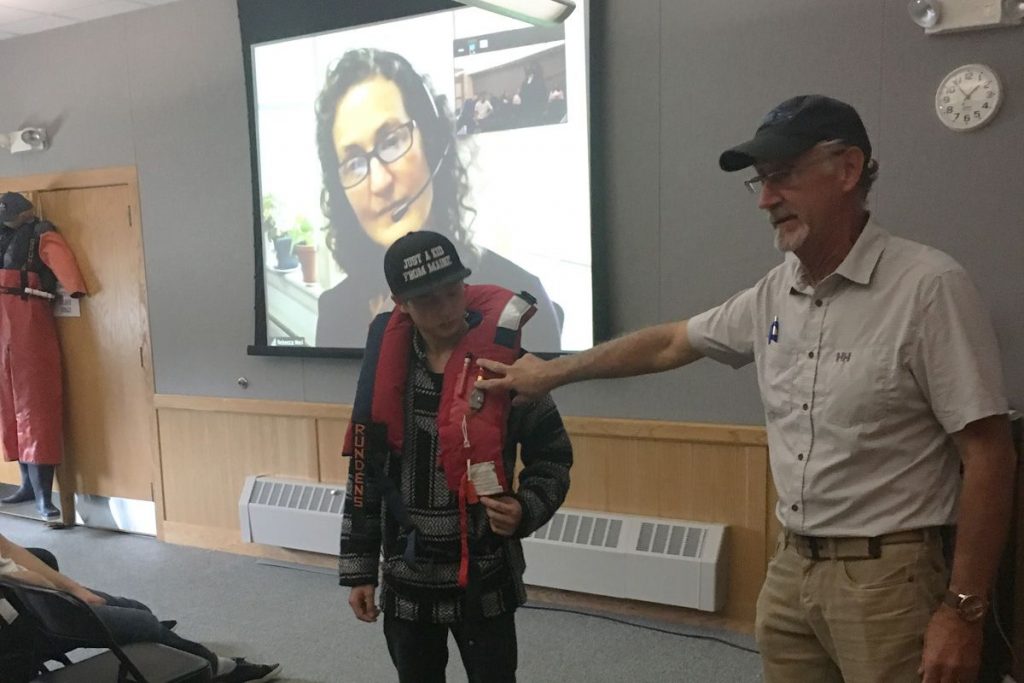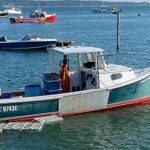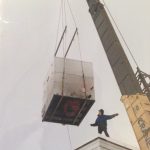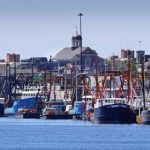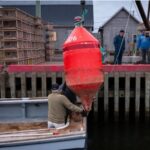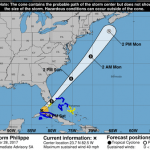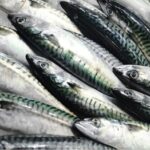It was the summer of 1978. Then-12-year-old Mike Kalaman approached the captains of two lobster boats on a pier in Westport. This was a common activity for Kalaman, whose father, a mechanic, secured him a job at a family friend’s fish market to keep him out of “trouble.” The Norwalk teen would run down to the boats tied up near the Westport market and fire away questions about the crustaceans that would be sold that day. “You want to see how this is done?” a captain finally asked him. That was the first day of Kalaman’s nearly 50-year career as a lobsterman. “You could go down to any beach anywhere in the state of Connecticut, at low tide, turn over rocks and find baby lobsters. That’s how prolific they were,” he recalls. Then came the die-off. Photos, more, >>CLICK TO READ<< 06:47
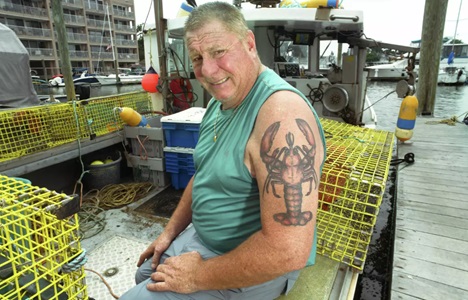
The last Connecticut lobstermen: How the LI Sound lobster die-off led to a ‘loss of identity’ for some fishermen
A new report acknowledged the ongoing damage done by dams on the Columbia River. But that’s only part of the story.
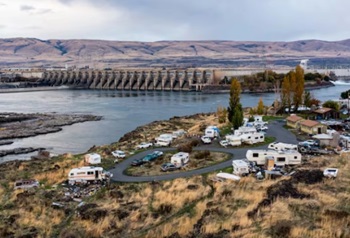 The Biden administration released a report this week acknowledging “the historic, ongoing, and cumulative damage and injustices that the federal dams on the Columbia River have caused and continue to cause to Tribal Nations.” In government documents from the 1940s and 1950s, obtained by OPB and ProPublica, officials openly discussed what they called “the Indian problem” on the Columbia River. At times, they characterized the destruction of the last major tribal fishery as a benefit of dam construction. The documents reveal that the government’s 1950s era of dam-building on the Columbia was marked not by a new report, but rather by a well-informed and intentional disregard for Native people. “These documents shine a spotlight on a historic wrong” U.S. Sen. Jeff Merkley, an Oregon Democrat, said in a statement. “The government’s actions wiped out tribal communities, houses, villages, and traditional hunting and fishing sites with thousands of years of history.” more, >>CLICK TO READ<< 21:10
The Biden administration released a report this week acknowledging “the historic, ongoing, and cumulative damage and injustices that the federal dams on the Columbia River have caused and continue to cause to Tribal Nations.” In government documents from the 1940s and 1950s, obtained by OPB and ProPublica, officials openly discussed what they called “the Indian problem” on the Columbia River. At times, they characterized the destruction of the last major tribal fishery as a benefit of dam construction. The documents reveal that the government’s 1950s era of dam-building on the Columbia was marked not by a new report, but rather by a well-informed and intentional disregard for Native people. “These documents shine a spotlight on a historic wrong” U.S. Sen. Jeff Merkley, an Oregon Democrat, said in a statement. “The government’s actions wiped out tribal communities, houses, villages, and traditional hunting and fishing sites with thousands of years of history.” more, >>CLICK TO READ<< 21:10
Mass mortality: A fish scientist follows a tip about die-offs at B.C. salmon farms
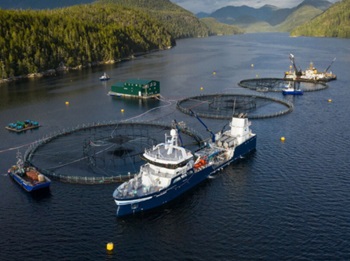 A tipster had told Proboszcz, a fisheries biologist at Watershed Watch Salmon Society, that salmon farms off the coast had been experiencing mysterious and massive die-offs and nobody was saying anything about it. “Yeah, it was a little crazy,” said Proboszcz of his decision to make the long trip. “But he didn’t know why they were dying.” Before Proboszcz left, a colleague had tracked a number of boats that were allegedly bringing fish all the way around the south end of Vancouver Island and into the Nanaimo area. But the boats had nearly finished shuttling all the fish, according to the anonymous source. Desperate, Proboszcz had tried to hire a skiff and even a helicopter to see what was going on. But nothing worked out, and so he decided to take matters into his own hands. Photos, more, >>CLICK TO READ<< 14:25
A tipster had told Proboszcz, a fisheries biologist at Watershed Watch Salmon Society, that salmon farms off the coast had been experiencing mysterious and massive die-offs and nobody was saying anything about it. “Yeah, it was a little crazy,” said Proboszcz of his decision to make the long trip. “But he didn’t know why they were dying.” Before Proboszcz left, a colleague had tracked a number of boats that were allegedly bringing fish all the way around the south end of Vancouver Island and into the Nanaimo area. But the boats had nearly finished shuttling all the fish, according to the anonymous source. Desperate, Proboszcz had tried to hire a skiff and even a helicopter to see what was going on. But nothing worked out, and so he decided to take matters into his own hands. Photos, more, >>CLICK TO READ<< 14:25
Nearly $12 million headed to Alaska in latest infusion of fishery-disaster aid
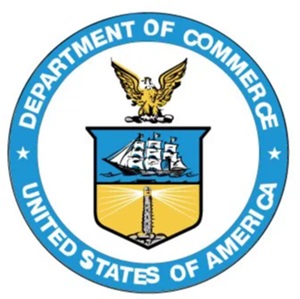 The aid money is for disasters declared for the 2022 chum salmon failure on the Kuskokwim River and the 2021-2022 sockeye salmon failure that affected Upper Cook Inlet setnet fishers. Aid for the Kuskokwim River disaster totaled $331,920, while aid for the Upper Cook Inlet sockeye disaster totaled nearly $11.5 million, according to the National Oceanic and Atmospheric Administration, which is a branch of the Commerce Department. Alaska is not the only state affected by poor salmon returns. Along with Friday’s announcement of aid for those affected by the Alaska salmon disasters, the Commerce Department announced $403,978 in aid for the Port Gamble S’Klallam Tribe’s 2021 Puget Sound fall chum and coho salmon fisheries in Washington state. more, >>CLICK TO READ<< 11:50
The aid money is for disasters declared for the 2022 chum salmon failure on the Kuskokwim River and the 2021-2022 sockeye salmon failure that affected Upper Cook Inlet setnet fishers. Aid for the Kuskokwim River disaster totaled $331,920, while aid for the Upper Cook Inlet sockeye disaster totaled nearly $11.5 million, according to the National Oceanic and Atmospheric Administration, which is a branch of the Commerce Department. Alaska is not the only state affected by poor salmon returns. Along with Friday’s announcement of aid for those affected by the Alaska salmon disasters, the Commerce Department announced $403,978 in aid for the Port Gamble S’Klallam Tribe’s 2021 Puget Sound fall chum and coho salmon fisheries in Washington state. more, >>CLICK TO READ<< 11:50
Market conditions continue to pressure seafood processors and fishermen
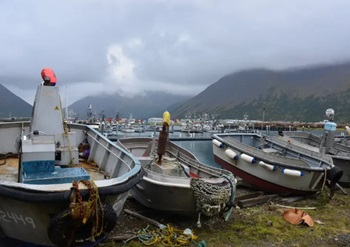 Consumers think of seafood as a premium purchase, which is not a good image when household budgets are tight and shoppers are worried about inflation. “The problem is not the fish,” said Jeremy Woodrow, executive director of the Alaska Seafood Marketing Institue. “The challenge is in the global marketplace.” Woodrow in February called the 2023 market for Alaska salmon “rock bottom” with low prices and weak demand, though maybe the industry was coming off that rocky bottom, he said then. Still, the pain is not gone. “A lot of buyers are barely holding on,” Woodrow said. “Our processors lost a lot of money the past year or two.” more, >>CLICK TO READ<< 09:40
Consumers think of seafood as a premium purchase, which is not a good image when household budgets are tight and shoppers are worried about inflation. “The problem is not the fish,” said Jeremy Woodrow, executive director of the Alaska Seafood Marketing Institue. “The challenge is in the global marketplace.” Woodrow in February called the 2023 market for Alaska salmon “rock bottom” with low prices and weak demand, though maybe the industry was coming off that rocky bottom, he said then. Still, the pain is not gone. “A lot of buyers are barely holding on,” Woodrow said. “Our processors lost a lot of money the past year or two.” more, >>CLICK TO READ<< 09:40
Letter: Dear BOEM
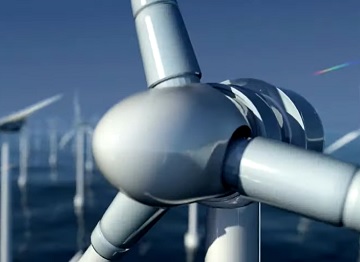 Your project of installing a wind power farm off the coast of Southern Oregon is in total disregard for the environment, economics, and people therein. The vibrations of the offshore turbines will alter the fishing grounds and the migration of whales, tuna, and salmon for years and destroy commercial fishing that feeds millions of people. The turbines will have to be in restricted waters. That will be followed by restricting the waters where the cables are laid (can’t have nets, anchors, et cetera dragged through). Next, your $$$moneymen will have to find land to bring the cabled power on shore thus trashing even more of the scenic coast of Oregon. And where will you house all the needed labor considering the critical housing shortage at this location? Confiscation via eminent domain perhaps? more, >>CLICK TO READ<< By Raymond J Van Eck 07:11
Your project of installing a wind power farm off the coast of Southern Oregon is in total disregard for the environment, economics, and people therein. The vibrations of the offshore turbines will alter the fishing grounds and the migration of whales, tuna, and salmon for years and destroy commercial fishing that feeds millions of people. The turbines will have to be in restricted waters. That will be followed by restricting the waters where the cables are laid (can’t have nets, anchors, et cetera dragged through). Next, your $$$moneymen will have to find land to bring the cabled power on shore thus trashing even more of the scenic coast of Oregon. And where will you house all the needed labor considering the critical housing shortage at this location? Confiscation via eminent domain perhaps? more, >>CLICK TO READ<< By Raymond J Van Eck 07:11

Family who lost loved ones on Spanish fishing vessel help unveil new N.L. monument
A new monument honouring 21 lives lost on a Spanish fishing boat that sank off the coast of Newfoundland in 2022 was unveiled in St. John’s on Friday by a Spanish delegation that included family of the deceased. The 50-metre-long fishing boat, called the Villa de Pitanxo, operated out of northwest Spain’s Galicia province. It sank at around 2:30 a.m. NT on Feb. 15, 2022. The crew was made up of 16 Spaniards, five Peruvians and at least three Ghanaians, and is the largest fishing disaster in Galicia in the last 50 years. Nine bodies were recovered from the water and repatriated to Spain, but the remaining 12 were never found. “The memorial is very important for the families. and all people from the sea. Fishermen, our families of the sea,” said María José de Pazo Friday. She lost her father, Francisco. Video, more, >>CLICK TO READ<< 18:36
P.E.I. lobster harvesters seeing low prices despite strong catches
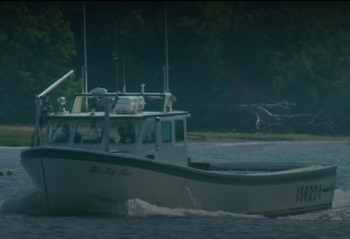 With only a few weeks left in lobster season on Prince Edward Island, fishers are seeing lower prices. New London, P.E.I., lobster harvester Peter Pidgeon said harvesters were hearing about the big prices in Nova Scotia and getting excited for the season. He said prices are currently sitting a little lower. “This year it’s a little lower. We’re at $6.25 a pound and $6.50 a pound right now.” Nat Richard, the executive director of the Lobster Processors Association, said the association is in the midst of the largest catch year ever in Canada. “The cost to hold inventory just went through the roof. That’s always a concern when you have an imbalance in terms of the supply and demand picture and that’s very much what we are dealing with this year,” he said. Video, more, >>CLICK TO READ<< 16:32
With only a few weeks left in lobster season on Prince Edward Island, fishers are seeing lower prices. New London, P.E.I., lobster harvester Peter Pidgeon said harvesters were hearing about the big prices in Nova Scotia and getting excited for the season. He said prices are currently sitting a little lower. “This year it’s a little lower. We’re at $6.25 a pound and $6.50 a pound right now.” Nat Richard, the executive director of the Lobster Processors Association, said the association is in the midst of the largest catch year ever in Canada. “The cost to hold inventory just went through the roof. That’s always a concern when you have an imbalance in terms of the supply and demand picture and that’s very much what we are dealing with this year,” he said. Video, more, >>CLICK TO READ<< 16:32
State and federal fisheries concerns addressed at Peltola public meeting
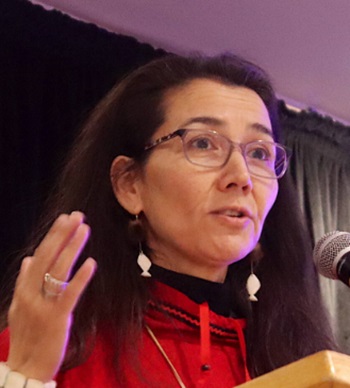 U.S. Rep. Mary Peltola, D-Alaska, held a fish-focused telephone town hall meeting on Thursday, June 20, during which people from across the state voiced concerns related to both state and federal fisheries. Those who called into the meeting, identified by first name only, provided both questions to Peltola and general comments. Callers expressed frustration with what they said were mixed messaging in fisheries management, the lack of understanding among elected officials, and the need for bipartisan work in addressing these issues. H.R. 8508, sponsored by Peltola and two others, authorizes National Oceanic and Atmospheric Administration to reauthorize their Bycatch Reduction and Engineering Program. The bill was referred to the House Committee on Natural Resources in May. more, >>CLICK TO READ<< 09:17
U.S. Rep. Mary Peltola, D-Alaska, held a fish-focused telephone town hall meeting on Thursday, June 20, during which people from across the state voiced concerns related to both state and federal fisheries. Those who called into the meeting, identified by first name only, provided both questions to Peltola and general comments. Callers expressed frustration with what they said were mixed messaging in fisheries management, the lack of understanding among elected officials, and the need for bipartisan work in addressing these issues. H.R. 8508, sponsored by Peltola and two others, authorizes National Oceanic and Atmospheric Administration to reauthorize their Bycatch Reduction and Engineering Program. The bill was referred to the House Committee on Natural Resources in May. more, >>CLICK TO READ<< 09:17
What does a California ban on salmon mean for the livelihood of fishermen?
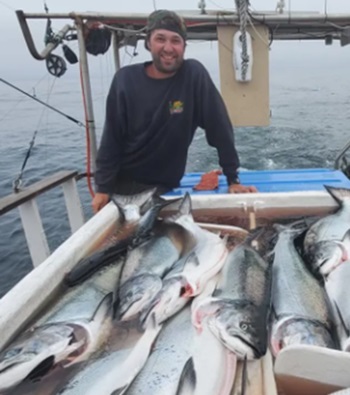 This time of year, Ben Hyman of Wild Local Seafood would like to be out on a boat, fishing for salmon. But for the second year in a row, federal fishery managers have closed all salmon fishing in California. The decision has devastated the state’s fishermen. “The Sacramento River system and the various rivers that stem from it are major producers of king salmon. Some of the largest runs in the world, and especially on the West Coast, have [come] from this river system,” Hyman says. “A lot of the fishing seasons are determined by how many fish make their way up the rivers. “Last year’s closure cost California fishermen approximately $45 million, with some sources saying that is only a fraction of the loss. Hyman says many of his colleagues have left the industry, including third-generation fishermen and those in the business for more than 50 years. more, >>CLICK TO READ<< 07:42
This time of year, Ben Hyman of Wild Local Seafood would like to be out on a boat, fishing for salmon. But for the second year in a row, federal fishery managers have closed all salmon fishing in California. The decision has devastated the state’s fishermen. “The Sacramento River system and the various rivers that stem from it are major producers of king salmon. Some of the largest runs in the world, and especially on the West Coast, have [come] from this river system,” Hyman says. “A lot of the fishing seasons are determined by how many fish make their way up the rivers. “Last year’s closure cost California fishermen approximately $45 million, with some sources saying that is only a fraction of the loss. Hyman says many of his colleagues have left the industry, including third-generation fishermen and those in the business for more than 50 years. more, >>CLICK TO READ<< 07:42
Agreement reached in fishermen’s suit against Golden Ray
 Federal lawsuits filed by commercial fishermen and charter fishing captains against the owners and operators of the Golden Ray were dismissed after an agreement was reached by all sides. A joint stipulation of dismissal filed Tuesday in the U.S. District Court’s Southern District of Georgia said the “parties have resolved this litigation.” Terms of the agreement were not disclosed. The Golden Ray capsized on its port side in the early hours of Sept. 8, 2019, while heading to sea with 4,161 vehicles and an estimated 380,000 of fuel in its tanks. Shrimpers like Johnny Bennett, captain of the Dora F, told The News in September 2022, when the lawsuit was filed, that he and his peers had been pulling up car bumpers and other parts from the water in their nets after the shipwreck. more, >>CLICK TO READ<< 06:17
Federal lawsuits filed by commercial fishermen and charter fishing captains against the owners and operators of the Golden Ray were dismissed after an agreement was reached by all sides. A joint stipulation of dismissal filed Tuesday in the U.S. District Court’s Southern District of Georgia said the “parties have resolved this litigation.” Terms of the agreement were not disclosed. The Golden Ray capsized on its port side in the early hours of Sept. 8, 2019, while heading to sea with 4,161 vehicles and an estimated 380,000 of fuel in its tanks. Shrimpers like Johnny Bennett, captain of the Dora F, told The News in September 2022, when the lawsuit was filed, that he and his peers had been pulling up car bumpers and other parts from the water in their nets after the shipwreck. more, >>CLICK TO READ<< 06:17
Florida Fisherman Pleads Guilty to Tax Evasion
 A Florida man pleaded guilty yesterday to evading taxes on income he earned from commercial fishing in Massachusetts. According to court documents and statements made in court, Christopher Garraty, of New Port Richey, and formerly of Newport and East Greenwich, Rhode Island, worked as a commercial fisherman and deckhand for fishing companies operating out of New Bedford, Massachusetts. Despite earning substantial income working as a fisherman, Garraty did not file until 2012 any federal income tax returns for tax years 2002 through 2011. When he filed the delinquent returns, he reported that he owed a total of approximately $234,497 in taxes for those nine years. But even after reporting that he owed taxes, Garraty did not make any payments to the IRS. In addition, Garraty did not file returns for 2015 through 2018 despite earning approximately $600,000 in fishing income across those years and owing approximately $179,382 in taxes. more, >>CLICK TO READ<< 16:07
A Florida man pleaded guilty yesterday to evading taxes on income he earned from commercial fishing in Massachusetts. According to court documents and statements made in court, Christopher Garraty, of New Port Richey, and formerly of Newport and East Greenwich, Rhode Island, worked as a commercial fisherman and deckhand for fishing companies operating out of New Bedford, Massachusetts. Despite earning substantial income working as a fisherman, Garraty did not file until 2012 any federal income tax returns for tax years 2002 through 2011. When he filed the delinquent returns, he reported that he owed a total of approximately $234,497 in taxes for those nine years. But even after reporting that he owed taxes, Garraty did not make any payments to the IRS. In addition, Garraty did not file returns for 2015 through 2018 despite earning approximately $600,000 in fishing income across those years and owing approximately $179,382 in taxes. more, >>CLICK TO READ<< 16:07
Highway Funds Illegally used for Floating Wind Factories
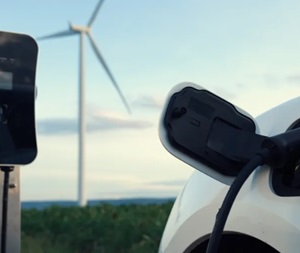 The Biden Administration is illegally redirecting hundreds of millions of dollars in highway grant money to fund construction of floating wind manufacturing facilities. The funding mechanism is the INFRA Grant Program in Biden’s Transportation Department. To begin with, here is how the website describes the Program: “What is the INFRA program? INFRA (the Nationally Significant Multimodal Freight & Highway Projects program) awards competitive grants for multimodal freight and highway projects of national or regional significance to improve the safety, efficiency, and reliability of the movement of freight and people in and across rural and urban areas.” Projects typically range from as little as $8 million up to $200 million. Here is their list of eligible projects, which is pretty clear and simple,,, more, >>CLICK TO READ<< 14:36
The Biden Administration is illegally redirecting hundreds of millions of dollars in highway grant money to fund construction of floating wind manufacturing facilities. The funding mechanism is the INFRA Grant Program in Biden’s Transportation Department. To begin with, here is how the website describes the Program: “What is the INFRA program? INFRA (the Nationally Significant Multimodal Freight & Highway Projects program) awards competitive grants for multimodal freight and highway projects of national or regional significance to improve the safety, efficiency, and reliability of the movement of freight and people in and across rural and urban areas.” Projects typically range from as little as $8 million up to $200 million. Here is their list of eligible projects, which is pretty clear and simple,,, more, >>CLICK TO READ<< 14:36
Sipekne’katik First Nation, federal government to begin mediation in effort to settle fishing dispute
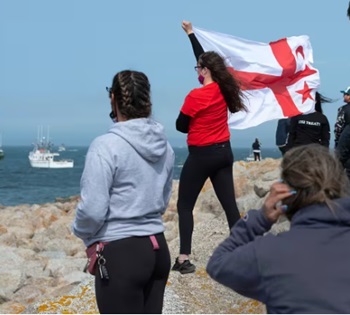 Litigation scheduled for next year that could have helped settle outstanding questions about treaty fishing rights related to the Marshall decisions will no longer happen, after a Nova Scotia Supreme Court judge granted a joint request from Sipekne’katik First Nation and the Attorney General of Canada to instead focus on mediation. The decision stems from a lawsuit Sipekne’katik filed in 2021 that wanted a declaration from the court that the federal Fisheries Act and regulations infringe on the treaty right to fish lobster for a moderate livelihood. That includes the prohibition on catching and holding lobsters without a licence and fishing outside of a commercial season. The trial was to start in May 2025, but this April, just as witness discovery was set to begin, the two parties served notice to the court that they’d reached an agreement to focus instead on mediation. They filed a joint request to have the trial dates and all other pretrial milestones adjourned. more, >>CLICK TO READ<< 12:37
Litigation scheduled for next year that could have helped settle outstanding questions about treaty fishing rights related to the Marshall decisions will no longer happen, after a Nova Scotia Supreme Court judge granted a joint request from Sipekne’katik First Nation and the Attorney General of Canada to instead focus on mediation. The decision stems from a lawsuit Sipekne’katik filed in 2021 that wanted a declaration from the court that the federal Fisheries Act and regulations infringe on the treaty right to fish lobster for a moderate livelihood. That includes the prohibition on catching and holding lobsters without a licence and fishing outside of a commercial season. The trial was to start in May 2025, but this April, just as witness discovery was set to begin, the two parties served notice to the court that they’d reached an agreement to focus instead on mediation. They filed a joint request to have the trial dates and all other pretrial milestones adjourned. more, >>CLICK TO READ<< 12:37
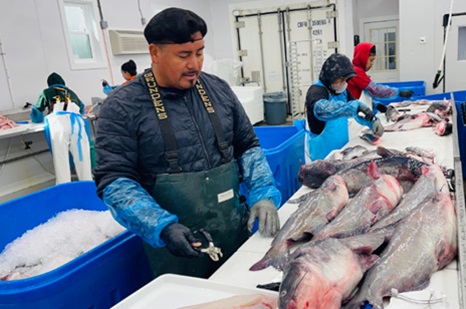
Wild-Caught Chesapeake Blue Catfish Phenomenon Booming: Thank Goodness
Buena Vista Seafood in San Francisco deals in high-end seafood from all around the world. European blue lobsters, Kambatia Reef Fish from Kenya, California Purple Urchins, and Icelandic Arctic Cod, to name a few. Now, the company has added wild-caught Chesapeake Blue Catfish to its list of offerings. “Chesapeake blue catfish check all the boxes,” says Polly Legendre,,, Legendre said the blue cats check the sustainability box because they’re an invasive species,” insanely prolific in terms of reproduction. Targeting them for harvest will help ease the toll they’re taking on the rockfish and blue crab populations, both iconic value species that have built the Chesapeake reputation. Tilghman Island Seafood’s processing capacity and dedication to quality control give their filets a long shelf life and are the reason we can get them from the East Coast to the West Coast in great condition. So they’re a sustainable and reliable fishery. more, >>CLICK TO READ<< 11:16
Governor urged to use ‘Oregon way’ in ocean wind energy development
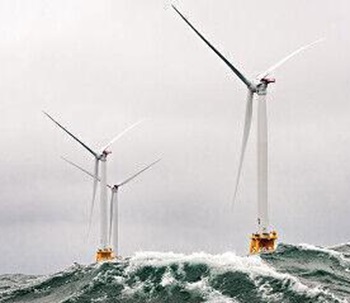 Oregon’s state seafood commodity commissions have expressed their concerns in a letter to Kotek over federal offshore wind energy development plans proposed for the southern Oregon coast. The letter emphasizes what the commission states are adverse effects on the ocean environment and Oregon’s sustainable seafood industry. Oregon Trawl, Oregon Dungeness Crab, Oregon Albacore and Oregon Salmon Commissions urged Kotek to prioritize Oregon’s own planning process under the auspices of the state official “Roadmap” initiative, intended to guide responsible offshore wind energy development in Oregon. The Oregon groups opposing the development said the offshore wind facilities will be built in the pristine ocean ecosystems that support remarkable marine biodiversity, including many protected species. No environmental studies have been performed to assess the risks of large-scale offshore wind energy production which risks overwhelming this unique remote ocean region, according to the opponents. more, >>CLICK TO READ<< 09:32
Oregon’s state seafood commodity commissions have expressed their concerns in a letter to Kotek over federal offshore wind energy development plans proposed for the southern Oregon coast. The letter emphasizes what the commission states are adverse effects on the ocean environment and Oregon’s sustainable seafood industry. Oregon Trawl, Oregon Dungeness Crab, Oregon Albacore and Oregon Salmon Commissions urged Kotek to prioritize Oregon’s own planning process under the auspices of the state official “Roadmap” initiative, intended to guide responsible offshore wind energy development in Oregon. The Oregon groups opposing the development said the offshore wind facilities will be built in the pristine ocean ecosystems that support remarkable marine biodiversity, including many protected species. No environmental studies have been performed to assess the risks of large-scale offshore wind energy production which risks overwhelming this unique remote ocean region, according to the opponents. more, >>CLICK TO READ<< 09:32
Why retired officer says Marine Police guarding the Chesapeake Bay are being ‘wasteful’
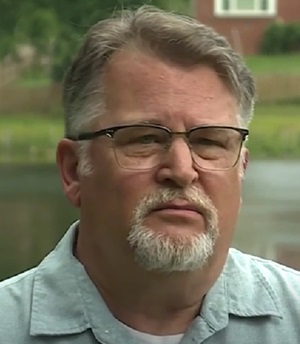 Andrew Cortez cares deeply about the Chesapeake Bay. “The Chesapeake Bay is our natural heritage,” Cortez said. “A healthy bay helps everyone.” The retired law enforcement officer was an investigator for 36 years, working to keep the Chesapeake in check with different agencies as a special agent with U.S. Fish and Wildlife. He now has concerns about the group meant to do just that: the Virginia Marine Resources Commission, which oversees Virginia Marine Police. “One of the things that really struck me is the amount of money they’re spending on what I would consider to be toys, unnecessary squandering of public money,” Cortez said. Photos, video, more, >>CLICK TO READ<< 07:38
Andrew Cortez cares deeply about the Chesapeake Bay. “The Chesapeake Bay is our natural heritage,” Cortez said. “A healthy bay helps everyone.” The retired law enforcement officer was an investigator for 36 years, working to keep the Chesapeake in check with different agencies as a special agent with U.S. Fish and Wildlife. He now has concerns about the group meant to do just that: the Virginia Marine Resources Commission, which oversees Virginia Marine Police. “One of the things that really struck me is the amount of money they’re spending on what I would consider to be toys, unnecessary squandering of public money,” Cortez said. Photos, video, more, >>CLICK TO READ<< 07:38
“Wicked Tuna” Star Opens Gloucester Fish Market
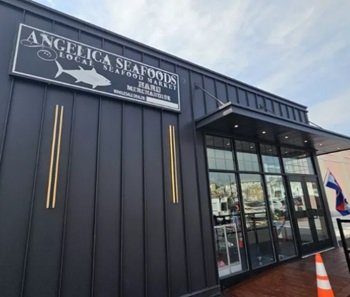 Reality television personality Dave Marciano opened his new fish market on Gloucester’s waterfront Thursday. Angelica Seafood Market, 52 Rear Commercial St., sells locally caught fish and merchandise from the show Marciano is known for, National Geographic’s “Wicked Tuna.” Despite his star power, Marciano said his market will work toward Gloucester’s greater good just like any other business. “Tourism is part of the fabric of the Gloucester community now,” Marciano said. “So anything, like the many other businesses, that we can add to get people into this town is all a positive.” more, >>CLICK TO READ<< 06:09
Reality television personality Dave Marciano opened his new fish market on Gloucester’s waterfront Thursday. Angelica Seafood Market, 52 Rear Commercial St., sells locally caught fish and merchandise from the show Marciano is known for, National Geographic’s “Wicked Tuna.” Despite his star power, Marciano said his market will work toward Gloucester’s greater good just like any other business. “Tourism is part of the fabric of the Gloucester community now,” Marciano said. “So anything, like the many other businesses, that we can add to get people into this town is all a positive.” more, >>CLICK TO READ<< 06:09
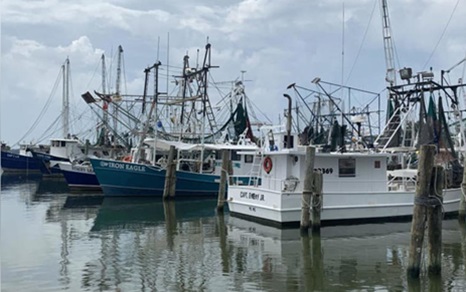
Seafood industry groups unite to oppose bill that would limit bottom trawls
A bill introduced last month in the U.S. House of Representatives that could place limits on trawling by fishermen and shrimpers is drawing the fire of seafood industry groups from Alaska to Florida. House Resolution 8507, the Bottom Trawl Clarity Act, would require the nation’s eight regional Fisheries Management councils, some of which allow fishing trawls to scrape the bottom, to define the terms “substantial” versus “limited” contact of the bottom. The bill is authored by U.S. Rep. Mary Peltola, D-Alaska, who said in a summary of the legislation that “limiting the areas where bottom trawling is allowed will help enhance marine health, diversity, and resilience, strengthening the ocean ecosystem that Alaska fishermen depend on.” more, >>CLICK TO READ<< 16:15
Bristol Bay Fishermen Cautiously Optimistic About 2024 Season Citing Higher Prices, New Processor
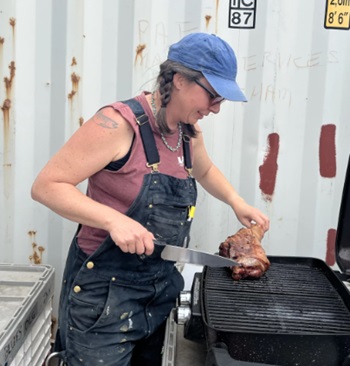 This season, the Bristol Bay 2024 sockeye salmon forecast estimates a total run of 39 million fish. That’s 35% smaller than the most recent 10-year average run size, and a drop from last season’s 54.5 million fish run. This weekend in Dillingham, the boatyard and harbor were noticeably quieter, with some discussion of crews holding off on big renovations and putting boats in the water later, to help cut costs and recover from last season’s low prices. But despite the lower forecast and market uncertainty, crews seem cautiously optimistic headed into the new season. Meghan Gervais, a long time captain of the F/V Maru takes a break from boat repairs to get out the grill. Gervais talks about her hopes for the coming season as she turns over a leg of lamb on the grill for family dinner, who is crewing with her this year. She’s been working on boats in Bristol Bay since 2006. “I feel cautiously optimistic,” Gervais said. Photos, more, >>CLICK TO READ<< 13:33
This season, the Bristol Bay 2024 sockeye salmon forecast estimates a total run of 39 million fish. That’s 35% smaller than the most recent 10-year average run size, and a drop from last season’s 54.5 million fish run. This weekend in Dillingham, the boatyard and harbor were noticeably quieter, with some discussion of crews holding off on big renovations and putting boats in the water later, to help cut costs and recover from last season’s low prices. But despite the lower forecast and market uncertainty, crews seem cautiously optimistic headed into the new season. Meghan Gervais, a long time captain of the F/V Maru takes a break from boat repairs to get out the grill. Gervais talks about her hopes for the coming season as she turns over a leg of lamb on the grill for family dinner, who is crewing with her this year. She’s been working on boats in Bristol Bay since 2006. “I feel cautiously optimistic,” Gervais said. Photos, more, >>CLICK TO READ<< 13:33
Harvesters Won’t Fish for Panel Price, Colossal Failure of Price Setting Panel Continues
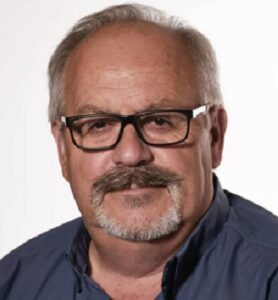 The offer from the Association of Seafood Producers (ASP) fails to provide a fair distribution of value and highlights the total failure of the price setting system in the province, and harvesters are refusing to fish. “The ask here is straightforward—capelin harvesters are seeking a fair share of the value derived from the capelin fishery. We are proposing a formula-based system that would account for market uncertainties and ensure that the value is evenly split between processors and harvesters. We need to guarantee that at least half the value of the fishery remains with the workers in Newfoundland and Labrador,” explains FFAW-Unifor President Greg Pretty. “If ASP members are serious about this being a shared industry under threat, then give us our fair share,” says Trevor Jones, fish harvester and Negotiating Committee member. “If the Province is serious about preserving the inshore fishery and keeping the value of the fishery in the hands of workers in this province, then they have to take a stronger stance. A minimum price must be a fair price,” says Jones. more, >>CLICK TO READ<< 11:12
The offer from the Association of Seafood Producers (ASP) fails to provide a fair distribution of value and highlights the total failure of the price setting system in the province, and harvesters are refusing to fish. “The ask here is straightforward—capelin harvesters are seeking a fair share of the value derived from the capelin fishery. We are proposing a formula-based system that would account for market uncertainties and ensure that the value is evenly split between processors and harvesters. We need to guarantee that at least half the value of the fishery remains with the workers in Newfoundland and Labrador,” explains FFAW-Unifor President Greg Pretty. “If ASP members are serious about this being a shared industry under threat, then give us our fair share,” says Trevor Jones, fish harvester and Negotiating Committee member. “If the Province is serious about preserving the inshore fishery and keeping the value of the fishery in the hands of workers in this province, then they have to take a stronger stance. A minimum price must be a fair price,” says Jones. more, >>CLICK TO READ<< 11:12
Canada to ban open-net pen salmon farming in British Columbia
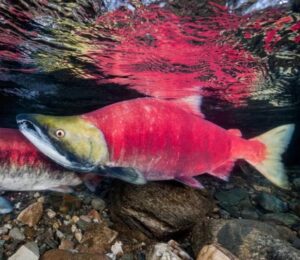 “Today, we are delivering on that promise and taking an important step in Canada’s path towards salmon and environmental conservation, sustainable aquaculture production, and clean technology,” said Jonathan Wilkinson, natural resources minister. There are dozens of the farms in British Columbia. More than half of wild salmon stock populations are declining in the province’s waters, according to the Pacific Salmon Foundation. Opinion polls have shown a majority of residents in British Columbia support ending open-net salmon farming, while more than 120 First Nations in the province have shown support for land-based closed containment fish farms. more, >>CLICK TO READ<< 09:27
“Today, we are delivering on that promise and taking an important step in Canada’s path towards salmon and environmental conservation, sustainable aquaculture production, and clean technology,” said Jonathan Wilkinson, natural resources minister. There are dozens of the farms in British Columbia. More than half of wild salmon stock populations are declining in the province’s waters, according to the Pacific Salmon Foundation. Opinion polls have shown a majority of residents in British Columbia support ending open-net salmon farming, while more than 120 First Nations in the province have shown support for land-based closed containment fish farms. more, >>CLICK TO READ<< 09:27
Gulf of Alaska trawl pollock vessels to be included in electronic monitoring program
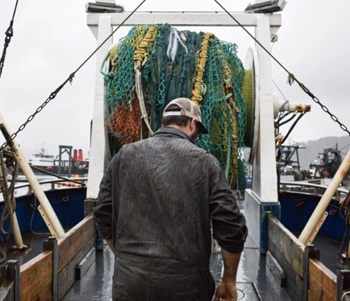 According to the 2023 annual report from the North Pacific Observer Program, the vast majority of groundfish harvest in Alaska is observed with full coverage, meaning 100% of all trips are monitored by either onboard observers or electronic monitoring. After years of testing the program, electronic monitoring will soon be expanded to include pelagic trawl pollock catcher vessels and tenders delivering to shoreside processors or stationary floating processors, across the Bering Sea and Aleutian Islands, and the Gulf of Alaska. That includes vessels that already have an observer on board. more, >>CLICK TO READ<< 07:55
According to the 2023 annual report from the North Pacific Observer Program, the vast majority of groundfish harvest in Alaska is observed with full coverage, meaning 100% of all trips are monitored by either onboard observers or electronic monitoring. After years of testing the program, electronic monitoring will soon be expanded to include pelagic trawl pollock catcher vessels and tenders delivering to shoreside processors or stationary floating processors, across the Bering Sea and Aleutian Islands, and the Gulf of Alaska. That includes vessels that already have an observer on board. more, >>CLICK TO READ<< 07:55
Rare blue lobster found by 82-year-old N.S. fisherman returned to the water
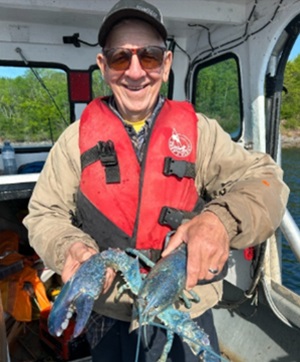 A rare blue lobster found by an 82-year-old Nova Scotia fisherman has been returned to the water. Richard Power of Mulgrave, N.S., caught the 3.5 pound crustacean last week in Pirate Harbour. A CTV Atlantic viewer said it was the first blue lobster he had seen in his 70 years of fishing lobsters. The lobster was then put on display at the market to allow the public to take photos and it was “safely released” to the Strait of Canso, where it was originally caught, shortly after. Photos, more, >>CLICK TO READ<< 06:48
A rare blue lobster found by an 82-year-old Nova Scotia fisherman has been returned to the water. Richard Power of Mulgrave, N.S., caught the 3.5 pound crustacean last week in Pirate Harbour. A CTV Atlantic viewer said it was the first blue lobster he had seen in his 70 years of fishing lobsters. The lobster was then put on display at the market to allow the public to take photos and it was “safely released” to the Strait of Canso, where it was originally caught, shortly after. Photos, more, >>CLICK TO READ<< 06:48
Lobster dealer sentenced to 5 years in prison for large fraud
 Terry Banks, a Brooklyn, N.S., man with a prior record for large-scale fraud, was sentenced Wednesday by Nova Scotia Supreme Court Justice Pierre Muise, in a case that reverberated in the lucrative lobster industry when charges were first laid in 2017. Crown prosecutor Rick Miller said outside the Halifax courtroom that lobster is a top Nova Scotia export and the industry deals in multimillion dollar transactions, but much of it still relies on trust, honesty and handshake deals to do business. “When you allow someone like Terry Banks to get into this industry and take advantage of that, then there’s a real detriment, because people go out of business, people lose their property, people lose their homes, their boats and everything,” he said. more, >>CLICK TO READ<< 16:34
Terry Banks, a Brooklyn, N.S., man with a prior record for large-scale fraud, was sentenced Wednesday by Nova Scotia Supreme Court Justice Pierre Muise, in a case that reverberated in the lucrative lobster industry when charges were first laid in 2017. Crown prosecutor Rick Miller said outside the Halifax courtroom that lobster is a top Nova Scotia export and the industry deals in multimillion dollar transactions, but much of it still relies on trust, honesty and handshake deals to do business. “When you allow someone like Terry Banks to get into this industry and take advantage of that, then there’s a real detriment, because people go out of business, people lose their property, people lose their homes, their boats and everything,” he said. more, >>CLICK TO READ<< 16:34
Littleproud predicts rough seas ahead for Illawarra wind zone under Coalition government
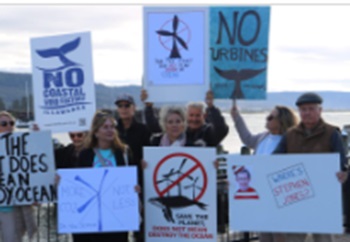 A future Coalition government would not allow a wind energy zone to be developed off the Illawarra coast, Nationals Leader David Littleproud said in Wollongong on Monday (17 June). To the cheers of a group of anti-wind zone protesters at Belmore Basin, Mr Littleproud said the Coalition would stop wind farms from going ahead. “There will be no wind zone, there is a better way to do this. Make no mistake, we’re going to live up to our international commitments, but we’re not going to tear away your economy, your environment and tear up the social cohesion of this great community,” he said. Mr Littleproud and NSW Nationals Senator Ross Cadell visited the region following the weekend declaration by Federal Climate Change and Energy Minister Chris Bowen of a 1022 square km wind zone area, 20 km off the coast. more, >>CLICK TO READ<< 11:53
A future Coalition government would not allow a wind energy zone to be developed off the Illawarra coast, Nationals Leader David Littleproud said in Wollongong on Monday (17 June). To the cheers of a group of anti-wind zone protesters at Belmore Basin, Mr Littleproud said the Coalition would stop wind farms from going ahead. “There will be no wind zone, there is a better way to do this. Make no mistake, we’re going to live up to our international commitments, but we’re not going to tear away your economy, your environment and tear up the social cohesion of this great community,” he said. Mr Littleproud and NSW Nationals Senator Ross Cadell visited the region following the weekend declaration by Federal Climate Change and Energy Minister Chris Bowen of a 1022 square km wind zone area, 20 km off the coast. more, >>CLICK TO READ<< 11:53
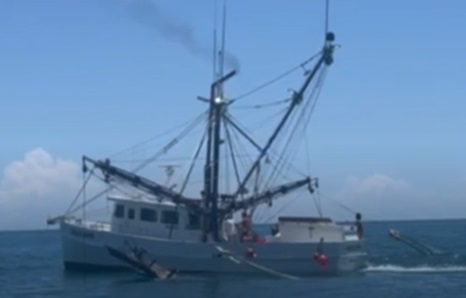
North Carolina: Debates over ending inshore trawling to protect marine life
For commercial fishermen like Thomas Smith, who works in the Pamlico Sound, shrimp trawling is essential for their livelihood. “Most of our income comes between July and November while working on inshore waters,” says Smith. He said that keeping shrimp trawling operations only in the ocean would only be viable for about two months each year, potentially devastating his business. “It would put me out of business,” he adds. Tim Gestwicki, CEO of the NCWF, supports ocean shrimp trawling but insists that inshore trawling must be stopped to protect juvenile fish species, such as the Southern flounder. “It’s time for us to catch up with the times and quit squandering our resources unnecessarily,” said Gestwicki. Video, more, >>CLICK TO READ<< 09:37
Athearn Marine Agency Boat of the Week: 34′ South Shore Lobster/Tuna Boat, John Deere 6081
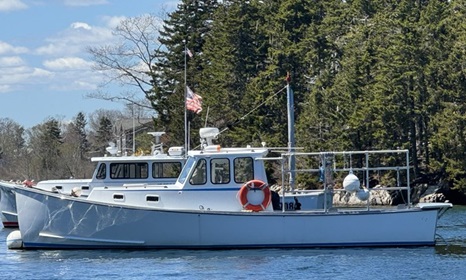 To review specifications, information, and 7 photos’, >click here<, To see all the boats in this series, >click here< 07:45
To review specifications, information, and 7 photos’, >click here<, To see all the boats in this series, >click here< 07:45
Floating Wind Madness in Maine
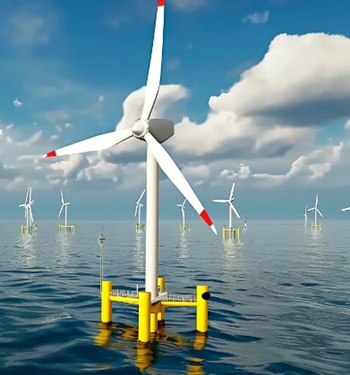 The Government of Maine has really big plans for floating wind, a floating net zero fantasy, in fact. Since floating wind power is the next big green thing, it is worth taking a close look at this ruinous vision. Floating wind is a fad, not an established technology. It has yet to be built at utility scale or tested in a hurricane. The world’s biggest grid-connected system is a tiny 50 MW and just came online off Scotland. The cost of floating wind is necessarily much greater than fixed wind. A fixed wind tower sits on a simple monopile, while a floating tower sits on a huge complex structure called a floater. We are talking about massive 500-foot towers with 500-ton turbines on top and 300-foot blades catching the wind. more, >>CLICK TO READ<< 06:17
The Government of Maine has really big plans for floating wind, a floating net zero fantasy, in fact. Since floating wind power is the next big green thing, it is worth taking a close look at this ruinous vision. Floating wind is a fad, not an established technology. It has yet to be built at utility scale or tested in a hurricane. The world’s biggest grid-connected system is a tiny 50 MW and just came online off Scotland. The cost of floating wind is necessarily much greater than fixed wind. A fixed wind tower sits on a simple monopile, while a floating tower sits on a huge complex structure called a floater. We are talking about massive 500-foot towers with 500-ton turbines on top and 300-foot blades catching the wind. more, >>CLICK TO READ<< 06:17






